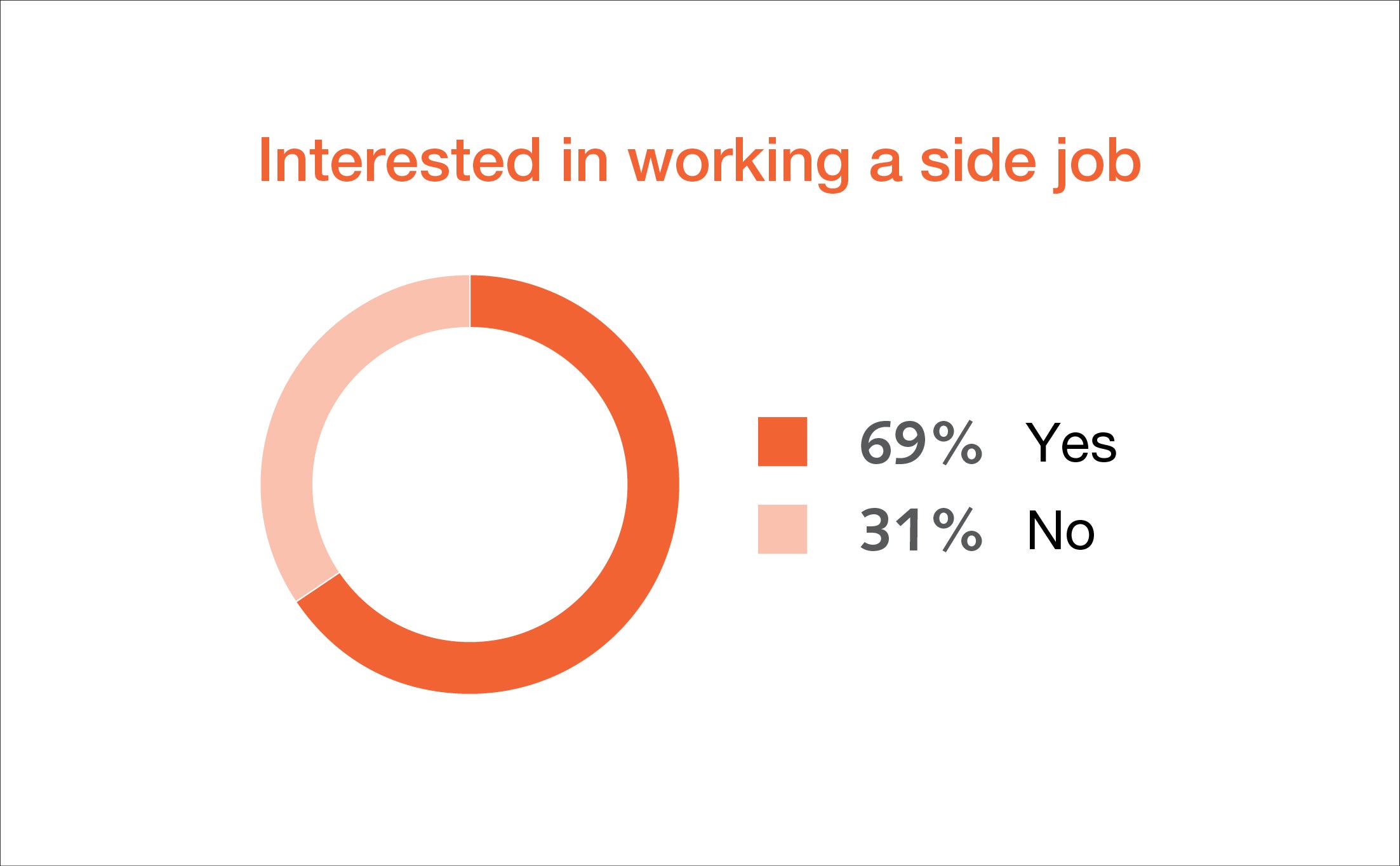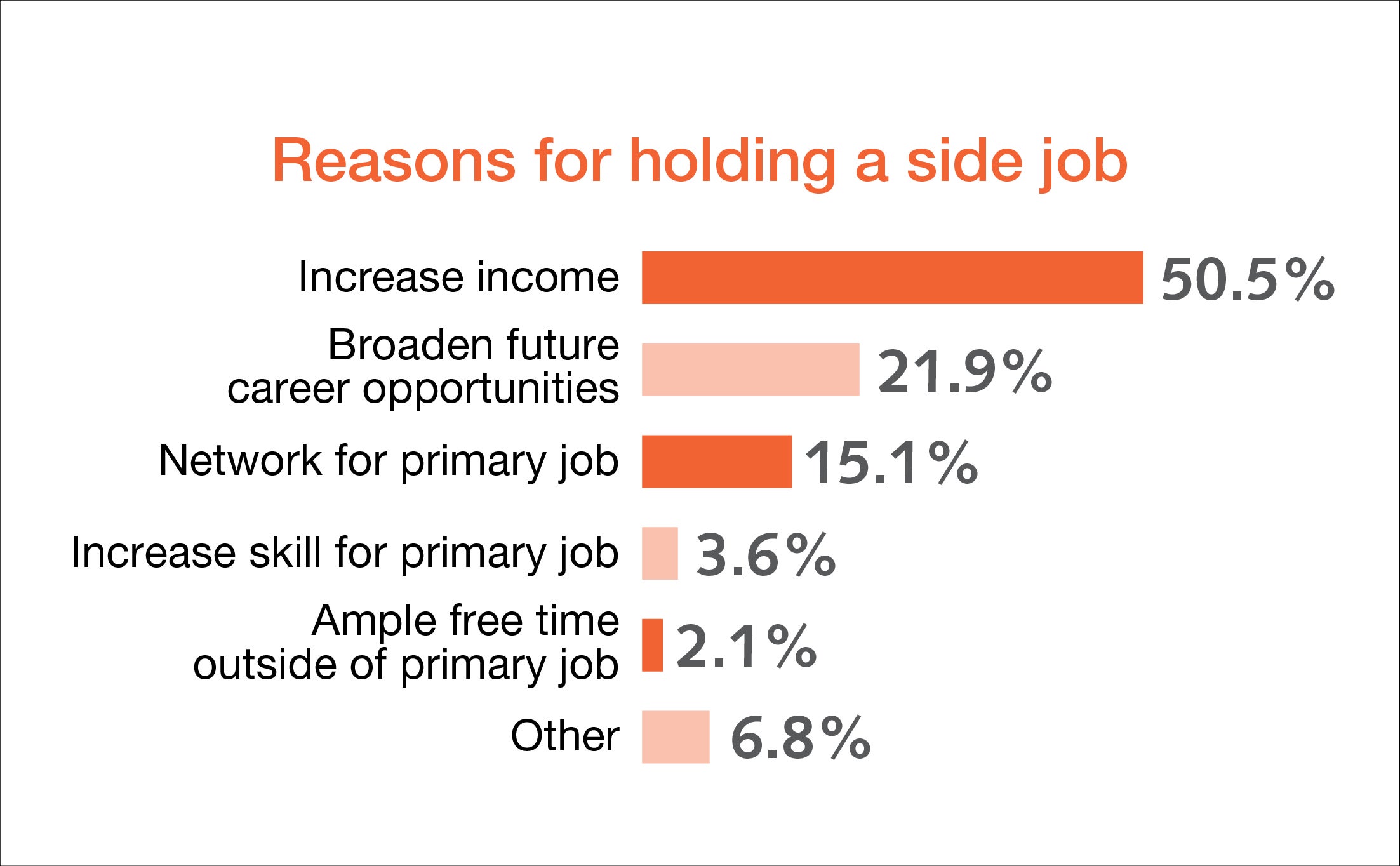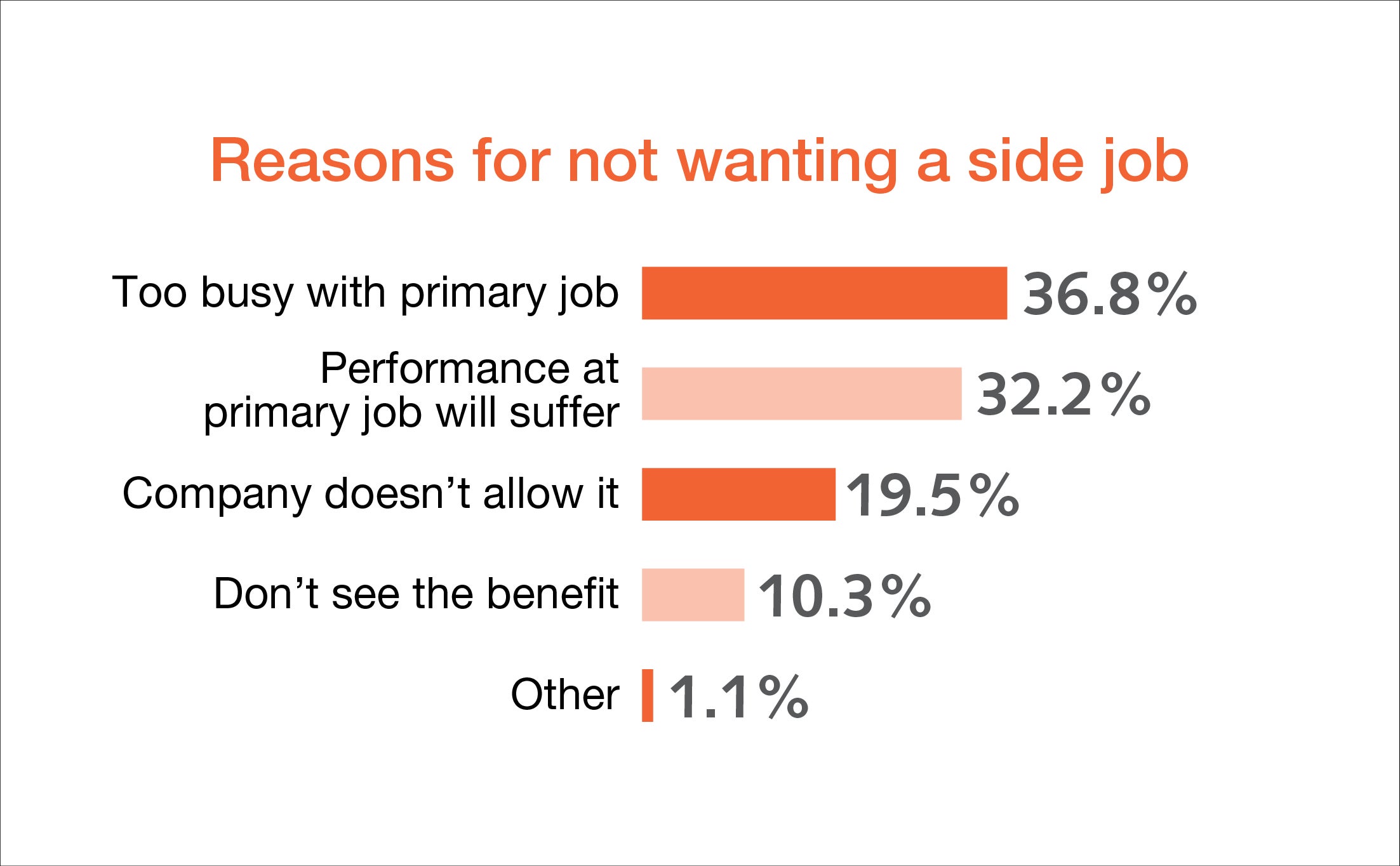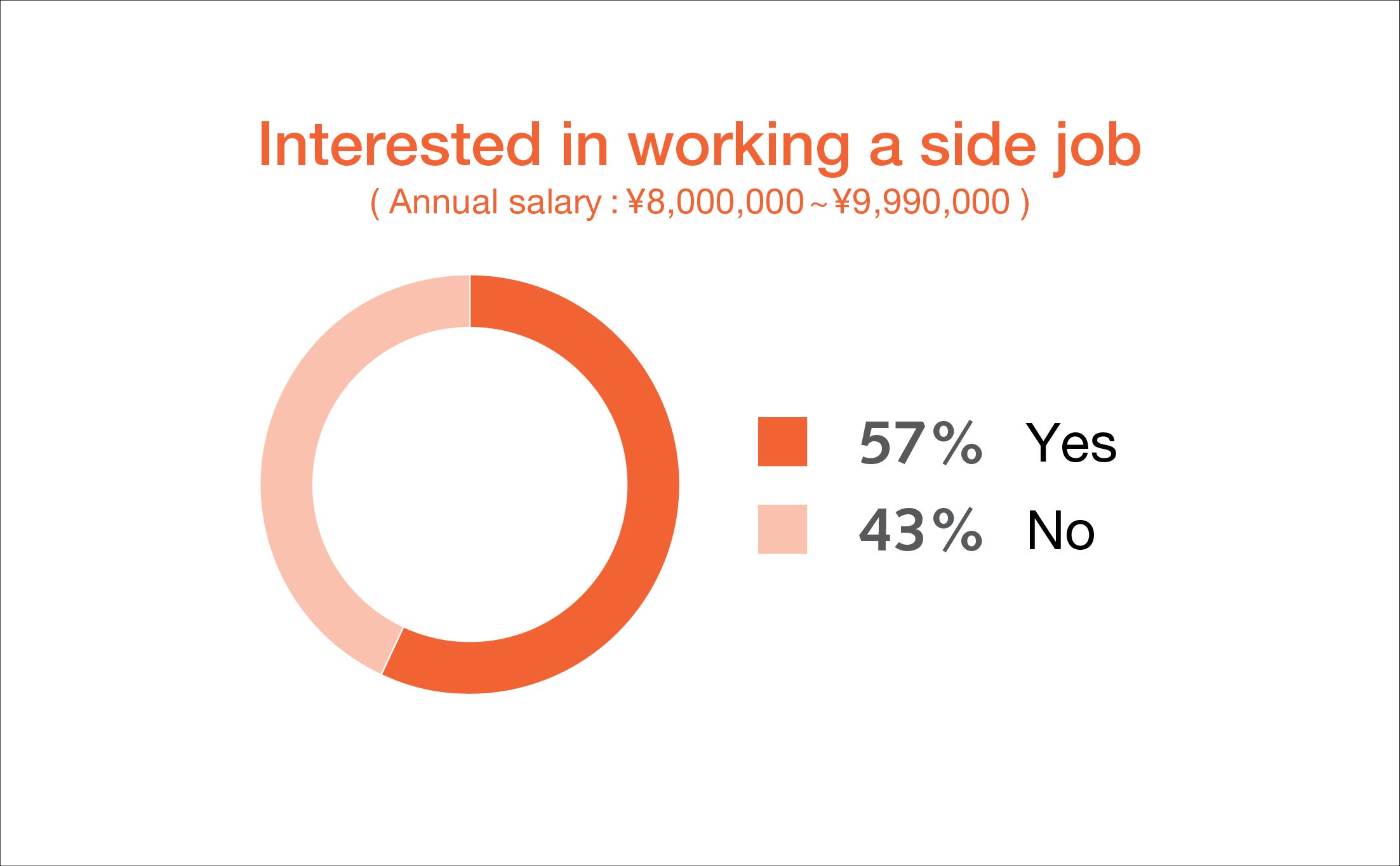Lifting on the ban on side businesses: A summary (2018)
The Government of Japan and other entities are currently encouraging companies to lift bans on “side businesses”. It's a practice in which employees undertake work that is separate from the company.). This is a part of a move to bring about a change in working patterns in Japan. From 2017 through 2018, we've seen a trend where companies are increasingly permitting their employees to engage in side businesses.
Concerns about risks relating to labour management, excessive working hours, industrial accidents, and the risk of information leaks are rising. But what factors are motivating the companies which are moving towards lifting the ban on side businesses? Also, how popular is the practice of sideline work likely to become as the ban is lifted? To answer these questions, Robert Walters Japan administered a large-scale questionnaire to company employees. We particularly targeted people who are using their English abilities and specialised skills at the front line of Japanese business. Based on the responses, this article offers some ideas on how to make the ban work for businesses.
When did companies begin to lift the ban on side businesses?
Much attention is currently being paid to trends at individual companies in terms of when they will lift the ban on side businesses. The results collected by the Ministry of Economy, Trade and Industry revealed that 18% of companies already permit side businesses and sideline work. Around 9.2% of companies are currently considering whether to lift the ban. A further 36.9% are considering lifting the ban “provided that certain inherent concerns can be eliminated”. (Source: Fact-finding Survey on Companies in Relation to the Revolution in Working Patterns, FY2016). The agreements that are reached regarding side businesses vary depending on the company. Hence, the surest way to check is to inquire at the human resources department of the company in question.
Aims of companies lifting the ban on side businesses: A boost in employees’ skills and increased networking opportunities
As mentioned above, more than 60% of companies are willing to lift the ban on side businesses. They hope that it will boost employees’ skills and enable networking with external organisations. Furthermore, it will help create an environment where employees can gain situational working experience in other fields. Employees can develop their skills and networks through side businesses, which they can then apply to their core business.
69% of employees “want to have side businesses”: Objectives include a desire for “networking that will also benefit my main company”
Of the 293 company employees who returned responses to a questionnaire targeting bilingual professionals working at either foreign affiliated companies in Japan or globally operating Japanese firms, 69% stated that they “want to engage in side businesses/sideline work.” For professionals working in the IT industry, the proportion rises to 78%. The results also show the desire to engage in side businesses and sideline work is becoming more common in the IT industry. The top reason cited for wanting to engage in side businesses was “I want to increase my income” (cited by 50.5%). Followed by “I want to expand the range of possibilities for my future (e.g., starting up a new business)” (21.9%). And “I want to develop networks to help with my main employment” (15.1%). This way of working will potentially bring about effects that accord with companies’ hopes that their employees will “make use of networks they develop in our own company’s business.”
More than 40% of management-level workers are interested in side businesses as a step towards changing jobs
In the Employment Attitudes Survey Among Managers in the Tokyo Area (2016 Second Half Edition) carried out by Japan Human Resources, 46% of respondents stated that they would like to engage in side businesses. It's either outside working hours or based on a model which allowed the number of working days to be adjusted if such setups were available. In addition, 42% of respondents stated that if they could use a system which permitted them to test their capabilities at a side business and then change jobs if they felt they are more suited to their new company, then they would like to make use of such a system; each of these figures represents almost half of all respondents. In Japan, many companies have selection-based systems/cultures which are used for determining candidates for senior management positions. However, many of those not selected are still experienced and capable professionals. They have the potential to demonstrate high levels of skill should they transfer to a different industry or to a different business setup. Permitting side businesses is one possible means for securing “battle-ready” human resources. These people can serve as assets to a company right away. It's also a way to overcome challenges that companies face in connection with labour mobility and dismissal.
31% of company employees do not want to engage in side businesses: Do mid-level employees and middle managers lack sufficient leeway to engage in such activities?
The most common reason given for this was “My hands are already full due to my main employment.". Cited by 36.8% of respondents.
Particularly, negativity towards the idea was found among 43% of company employees in the 8-9 million yen annual income bracket. A reasonable assessment of such employees is that they have less freedom than other segments. This could be due to difficulties in finding extra time due to the volume of work and their heavy responsibilities. In addition to the fact that this age group faces growing responsibilities in raising children and caring for family members. Many professionals stated, “I don’t have sufficient leeway to take on another job in addition to my main one,” and “doing other things will negatively impact my results and evaluations at my main company,”. In order to dispel their worries, companies will need to work hard to develop initiatives. This includes reducing work volume through labour-saving processes and rethinking evaluation systems.
Points for companies to consider: Any side businesses that employees engage in must be applied for and recorded with meticulous care
While the current trend is to lift the ban on side businesses, the risks involved are also attracting attention. From the perspective of companies which provide workers’ main employment, it includes a decrease in productivity. Problems caused by employees working too much (excessive working hours/overwork). Taxation-related problems and leaks of confidential or personal information. To avoid such problems, the most important thing is that employees engaging in side businesses must be meticulous about submitting applications to their companies. They must create records of the work they do. Furthermore, when a company lifts the ban, the company or its HR department must explain it using appropriate communication tools.
Related content
View allOver the last few years, there’s been significant shifts in the workplace. From increased tech adoption to the way employers hire, they all serve as a clear signal that the way we work and approach our jobs is changing. For employers, there’s an increased focus on training and support to really get
Read MoreIn recent years, the introduction of technologies and services in the field of human resources called “HR tech” has been progressing worldwide. As the use of cloud computing and big data increases the efficiency of operations, HR jobs will shift from management tasks to management strategies such as
Read MoreAbout mentorship programmes Mentorship programmes involve assigning existing employees at a company to provide support for new recruits. These assigned employees are different from the new recruits' direct superiors. They are selected from people around the same age or with a similar employment hist
Read More



